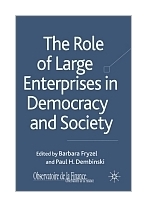|
||
• wydawnictwa polskie
• Zamów informacje o nowościach z wybranego tematu • kontakt
• Cookies na stronie |
THE ROLE OF LARGE ENTERPRICES IN DEMOCRACY AND SOCIETYFRYZEL B. DEMBINSKI P.H. (EDITORS)wydawnictwo: PALGRAVE MACMILLAN , rok wydania 2010, wydanie Icena netto:
In answering a general question about the role of large enterprises in society, this book uses political and democratic studies perspectives as well as economic, philosophical and managerial to provide practical insight into issues such as the extensive economic power of large enterprises and the changing balance of power between public and private sector. BARBARA FRYZEL graduated from the University of Economics in Krakow,
Poland (MSc in Corporate Finance) followed by a PhD in Economics, Management Sciences
from the Jagiellonian University, where she is currently an Associate Professor of
Management. She was an Honorary Research Fellow at the University College London in
2006-2008 and is the Laureate of the Fellowship Program for Young Scientists from the
Foundation for Polish Science. She has extensive management experience from her previous
commercial engagements in Poland including Real Estate Administration Manager for British
Petroleum, Commercial Manager for Ahold Real Estate Europe and Associate Director
Professional Consultancy for CBRE. Table of Contents PART I: DEMOCRACY AND CORPORATE LOBBYING Private Interests and Democracy; J.Krzysztof Bielecki PART II: CORPORATE POWER Economic Power and Social Responsibility of Very Big Enterprises: Facts and
Challenges; P.H.Dembinski PART III: ARE THE CORPORATIONS REALLY RESPONSIVE TO SOCIAL CONCERNS? Implementation of Compliance Programmes in Multinational Organizations;
J.Mean PART IV: GLOBAL ISSUES IN CORPORATE SOCIAL RESPONSIBILITY In Search for a New Balance: The Ethical Dimension of the Crisis;
W.Gasparski, A.Lewicka-Strzalecka, B.Rok& Dariusz Bak 328 pages, Hardcover Księgarnia nie działa. Nie odpowiadamy na pytania i nie realizujemy zamówien. Do odwolania !. |


